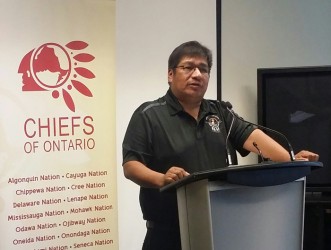Article Origin
Volume
Issue
Year
Neskantaga First Nation has had a boil water advisory for more than 20 years. “It is one of the longest ones in Canada,” said Chief Wayne Moonias.
“Canada is a country that’s rich in resources and our First Nation is still struggling to have safe drinking water in their homes.” Neskantaga First Nation is a remote community located 400 kms north of Thunder Bay.
Chief Moonias was in Toronto for a press conference on Oct. 5 to generate public support for concrete action to resolve the water crisis in their community.
“We’re only 350 people,” he said, “but we’re still human beings. We’re still people that require safe drinking water.”
“Imagine if you had to walk in minus 25 degree weather, imagine if you had to walk a km or two just to get your two litres or four litres of water,” said Moonias. “Something is not right when our Elders have to walk maybe a kilometer or two to get clean drinking water from the reverse osmosis unit.” The unit was installed by the federal government as a ‘Band-Aid’ solution, said Moonias.
It’s not just safe water for drinking that the community needs. It’s also water for bathing. “Our people are not able to bathe or care for their kids without having to deal with sores or rashes from exposure to the water,” the Chief said.
“This long-standing issue has really put a strain on our people and we’re calling on the public to call on the government.”
Ontario Regional Chief Isadore Day joined Chief Moonias at the podium. Recently appointed as the health portfolio holder at the AFN, Day said the Chiefs of Ontario supports Neskantaga’s call for action. “Access to clean drinking water is a human right enjoyed by everyone in Canada except First Nations,” he said.
The lack of clean drinking water in First Nations communities contributes to “a quiet health crisis that is destroying our communities and making our people sick,” said Day. “In fact, this quiet health crisis is killing our people.”
The water crisis is caused entirely by a lack of political will in Ottawa, he said, and both Ottawa and Ontario need to work with First Nations to address the issue.
First Nations get caught in the middle of the ping-pong match between Ontario and Canada regarding who has jurisdictional responsibility.
Chief Day said the government needs to invest about $4.7 billion to upgrade water systems in First Nations communities across Canada.
Chief Moonias said his 20-year-old son has never been able just to turn on the tap in their home to get a glass of drinking water. Nor has he been able to enjoy a shower. This has become a normal situation for the children and young people, he said, they’ve never known anything different. Our people are getting frustrated, Moonias said, and they want action.
“Water is the essence of life,” Moonias said, “our Elders have told us that all along. Today, my people are not able to enjoy that.”
Moonias said they are starting to develop alliances. A documentary crew recently completed a film about the water crisis and may be viewed on-line at www.vice.com.
In the meantime, the chief said, mining companies are anxious to extract the abundance of resources that sit on the traditional lands of Neskantaga First Nation. The community sits in the centre of the Ring of Fire.
In an interview following the press conference, Chief Day said they are investigating the possibility of legal action against the Crown.
“When you see a situation like Walkerton happen with such a fast response of, let’s fix all the water systems in Ontario because people are dying,” he said, “the same response should be afforded, and should have been afforded to First Nations a long time ago.”
Photo caption: Neskantaga First Nation Chief Wayne Moonias - saying community has had a boil water advisory for more than 20 years.
- 3297 views

